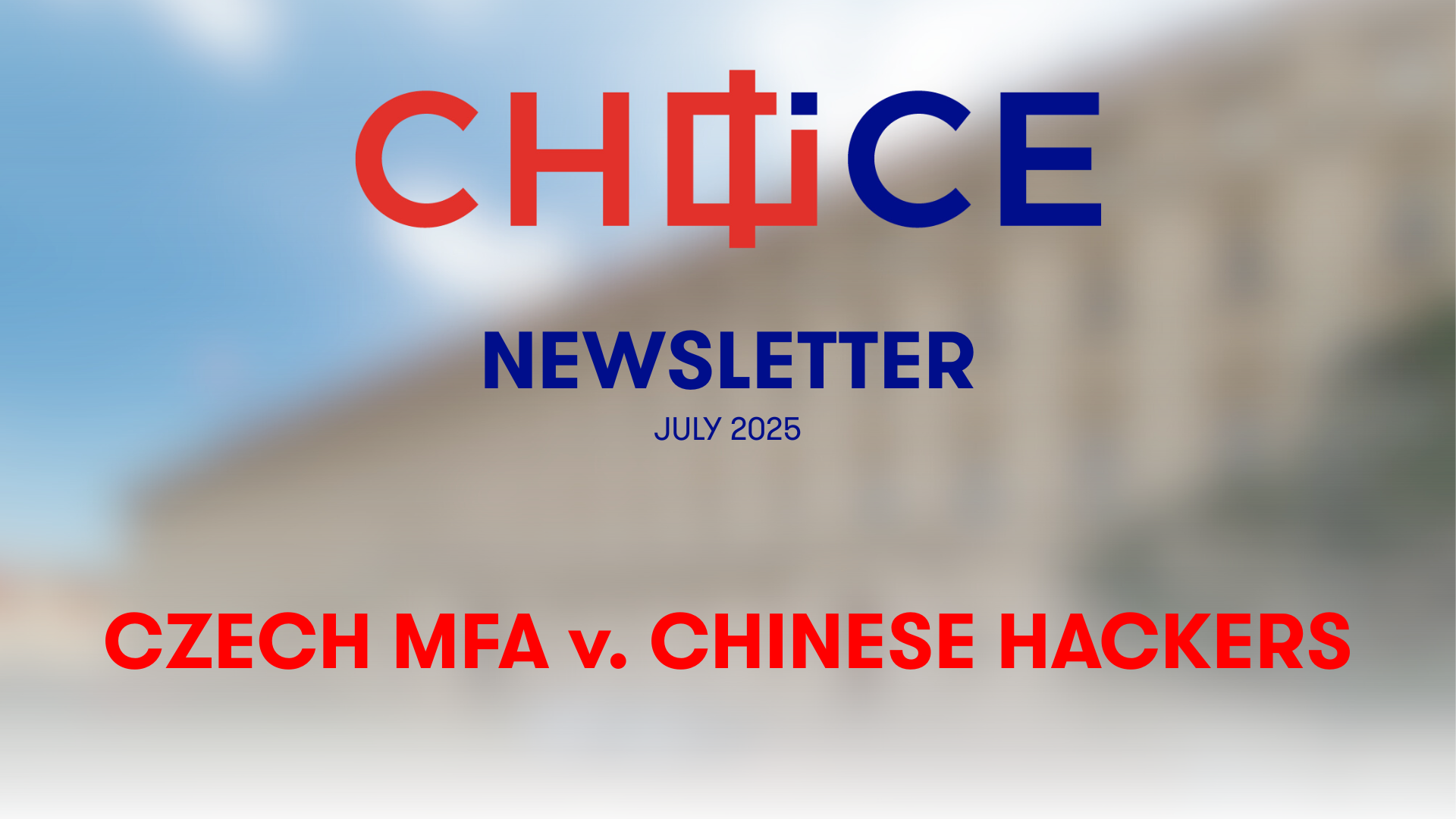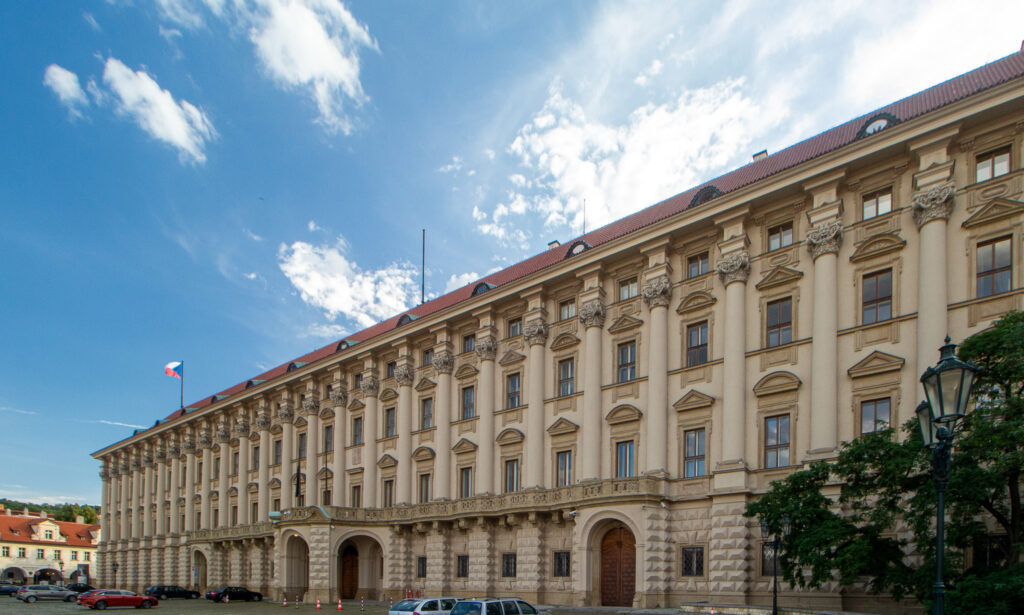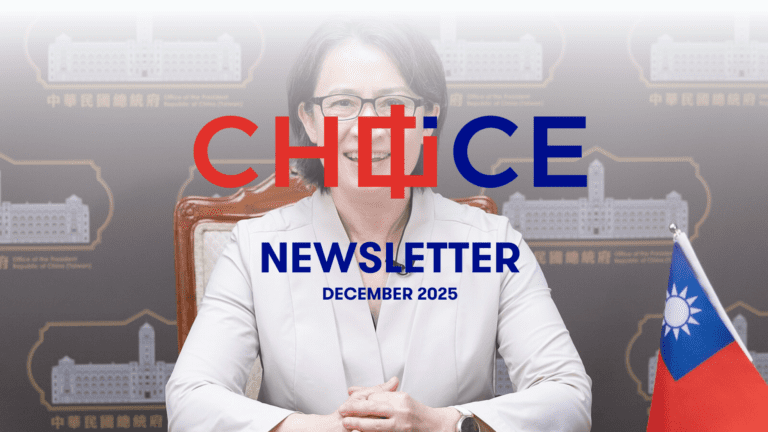CHOICE Newsletter: Czech MFA vs. Chinese Hackers

Welcome to the June issue of our monthly newsletter! The past month has been particularly busy for us at CHOICE. We have been working hard to conclude several major research projects, plan future events with our partners and finalize our first joint issue with Taiwan Insight, one of our existing partners; all while attending conferences and recruiting a new analyst (who will hopefully join our team in September).
For those of you who may have missed some articles in this special issue on ‘Green Synergies: Sustainability, Security and Taiwan-Europe Collaboration,’ make sure to check them out! You can also access all articles in a PDF version here.
Moving beyond the immediate developments within our team, the Czech Republic has been recovering from a cyberattack on its Ministry of Foreign Affairs, which has been publicly attributed to the Chinese state-affiliated hacker group APT31. Meanwhile, in Taiwan, the Ministry of Education under the current DPP-led government is developing new teaching materials for public schools. The alleged purpose is to “identify China’s threats” and “forge a stronger national identity.” This is not only representative of the continued politicisation of school curricula, but it also raises important questions about Taiwanese identity and its relationship to perceptions (and understanding) of China.
CHOICE Take

The Czech State and Chinese Hackers
On May 25, 2025, the government of the Czech Republic released a public statement identifying the Advanced Persistent Threat 31 (APT31) group associated with the Chinese Ministry of State Security as the sole actor responsible for malicious cyberattacks on one of the unclassified networks used by the Czech Ministry of Foreign Affairs.
The campaign itself, which was identified as dating back to 2022 when Czechia held the rotating presidency of the Council of the EU, does not represent a significant new development. APT31 has previously targeted several other EU member states. Moreover, Czech intelligence agencies involved in the investigation – namely the Security Information Service (BIS) and the National Cyber and Information Security Agency (NÚKIB) – have been warning about increasing espionage activities by Chinese groups for years, with the activities targeting both government institutions and commercial actors. Indeed, BIS highlighted potential cybersecurity threats related to Chinese telecommunications giants as early as 2013, while NÚKIB issued a public warning against the use of Huawei and ZTE in the country’s telecommunications networks in 2018. NÚKIB’s annual reports on the state of cybersecurity in Czechia have identified persistent threats posed by Chinese (and Russian) actors to strategic institutions ever since.
What does mark a significant new development, however, is the public attribution. The Czech government has directly named China as the perpetrator, a move that was followed by expressions of solidarity from the EU, NATO and several EU member states, all of which have condemned the malicious behavior in cyberspace and voiced concerns about the growing proliferation of such activities by Chinese actors targeting the EU and its member states. And while the official EU statement has adopted a more cautious tone – unsurprising given the upcoming EU-China summit in July – several EU officials, including the Commisison Vice-President Kaja Kallas, used sharper rhetoric in their subsequent public appearances.
The attribution came only a few days after a joint statement by several EU members, including the Czech Republic, disclosing and condemning a cyberespionage campaign by Russian actors targeting tech, defense and transport firms involved in supporting Ukraine. Against this backdrop, the rising concerns about cyberthreats are certainly not surprising. However, they also need to be understood in the context of the EU’s evolving (whether rhetorically or substantively) position on China and the growing plethora of (cyber)security, (geo)economic and (geo)political risks associated with China within the bloc.
By Dominika Remžová, CHOICE Analyst (based in Nottingham)
Taiwan in Focus
China Competence for the People: A Much-Needed Missing Piece in Taiwan’s Battle over Identity Politics
Taiwan’s two main political parties – the Kuomintang (KMT) and the currently ruling Democratic Progressive Party (DPP) – have both, over the years, instrumentalized school curricula to serve their own political interests. The aim has been either to emphasize historical and cultural continuity with China or to underscore Taiwan’s identity as distinct from China.
Such policies have undoubtedly contributed to today’s paradox: while support for the current status quo – i.e., maintaining an ambiguous definition of what is referred to as “China” on both sides of the Taiwan Strait – remains remarkably stable at around 80 percent, the number of Taiwanese identifying solely as Taiwanese has increased dramatically, from around 18 percent in 1992 to over 60 percent today.
This shift has created its own challenge: apart from a small group of excellent Taiwan-based experts on China, the vast majority of the Taiwanese public knows less and less about China. Besides, while cross-strait travel and exchanges once offered opportunities for first-hand experience of China, these have sharply declined since COVID-19 and Beijing’s implementation of stringent anti-separatism laws. The number of Taiwanese living in China has dropped, and Chinese tourists have virtually disappeared from Taiwanese streets.
This summer, as part of President Lai Ching-te’s new strategy to bolster Taiwan’s security, the Ministry of Education is developing new teaching materials that will be included in public schools this fall. The aim is to “identify China’s threats” and “forge a stronger national identity.” As Ukraine’s experience demonstrates, the best way to effectively confront an aggressive neighboring power is to understand it deeply.
Shifts in identity cannot erase geography: China is – and will remain – Taiwan’s neighbor. Mainstream Taiwanese society cannot afford to assume that “not being interested in China” is a responsible attitude. And while Sunzi’s Art of War has been widely over-quoted, one of his most enduring insights remains apt: 知己知彼,百战不殆 – Knowing yourself and your enemy, and you will never lose a battle.
By Filip Noubel, CHOICE Analyst (based in Taipei)
WiCH Highlights
🇩🇪 Janka Oertel, a WiCH Co-Chair for Germany, has recently published her policy brief with Jakub Jakobowski on the dependence of German automotive industry on China and its impact on the CEE countries. Read it here!
🇫🇮 Sari Arho Havrén, a WiCH Co-Chair for Finland, presented at NATO’s annual Nuclear Policy Symposium in Helsinki about China’s perceptions on NATO and security implications for Europe and NATO. Read more here!
🇺🇦 Nataliya Butyrska, a WiCH Co-Chair for Ukraine, has written an article about China’s role in the Russia-Ukraine war for the Prospect Foundation. Read it here!
CHOICE News
 We have released a full joint issue with our partners at Taiwan Insight! In this series of articles, experts from our CHOICE network and the Taiwan Insight network focus on Green Synergies: Sustainability, Security and Taiwan-Europe Collaboration. (read it here)
We have released a full joint issue with our partners at Taiwan Insight! In this series of articles, experts from our CHOICE network and the Taiwan Insight network focus on Green Synergies: Sustainability, Security and Taiwan-Europe Collaboration. (read it here)
 Our sister project, MapInfluenCE, has just published two new papers! First one, „Czerwona lampka” czy zielone światło? Chińskie inwestycje w Polsce by Joanna Nawrotkiewicz focuses on Chinese FDI in Poland. (read it here) The second one, The Cost of Going Green: Chinese EVs and Their Local Impact in Slovakia looks at case studies of Chinese investment into electric vehicles and the challenges these brought to Slovakia. (read it here)
Our sister project, MapInfluenCE, has just published two new papers! First one, „Czerwona lampka” czy zielone światło? Chińskie inwestycje w Polsce by Joanna Nawrotkiewicz focuses on Chinese FDI in Poland. (read it here) The second one, The Cost of Going Green: Chinese EVs and Their Local Impact in Slovakia looks at case studies of Chinese investment into electric vehicles and the challenges these brought to Slovakia. (read it here) Ivana Karásková, CHOICE Founder and Lead, respresented CHOICE at the event at the George C. Marshall Centre in Garmisch, talking about China’s evolving approach to Europe! (check it out here)
Ivana Karásková, CHOICE Founder and Lead, respresented CHOICE at the event at the George C. Marshall Centre in Garmisch, talking about China’s evolving approach to Europe! (check it out here) Our Analyst Dominika Remžová also spoke at the 50th anniversary of the BISA conference in Belfast, presenting about German and Chinese influence in the automotive industry: “Made in CEE: The Auto Industry and the Geo-Economics of EU-China Relations”. (check it out)
Our Analyst Dominika Remžová also spoke at the 50th anniversary of the BISA conference in Belfast, presenting about German and Chinese influence in the automotive industry: “Made in CEE: The Auto Industry and the Geo-Economics of EU-China Relations”. (check it out)
 We interviewed Michal Myklín, Director of the Central Analytics Department at the National Cyber and Information Security Agency (NÚKIB) of the Czech Republic, in our Czech-language podcast, Stíny Číny (Shadows of China)! (check it out)
We interviewed Michal Myklín, Director of the Central Analytics Department at the National Cyber and Information Security Agency (NÚKIB) of the Czech Republic, in our Czech-language podcast, Stíny Číny (Shadows of China)! (check it out)
This is the web version of our newsletter. If you’d like to receive the CHOICE newsletter in advance, straight to your inbox, sign up here:
Written by
CHOICE
CHOICE is a multinational consortium of experts providing informed analysis on the rising influence of the People’s Republic of China within the countries of Central and Eastern Europe (CEE).


